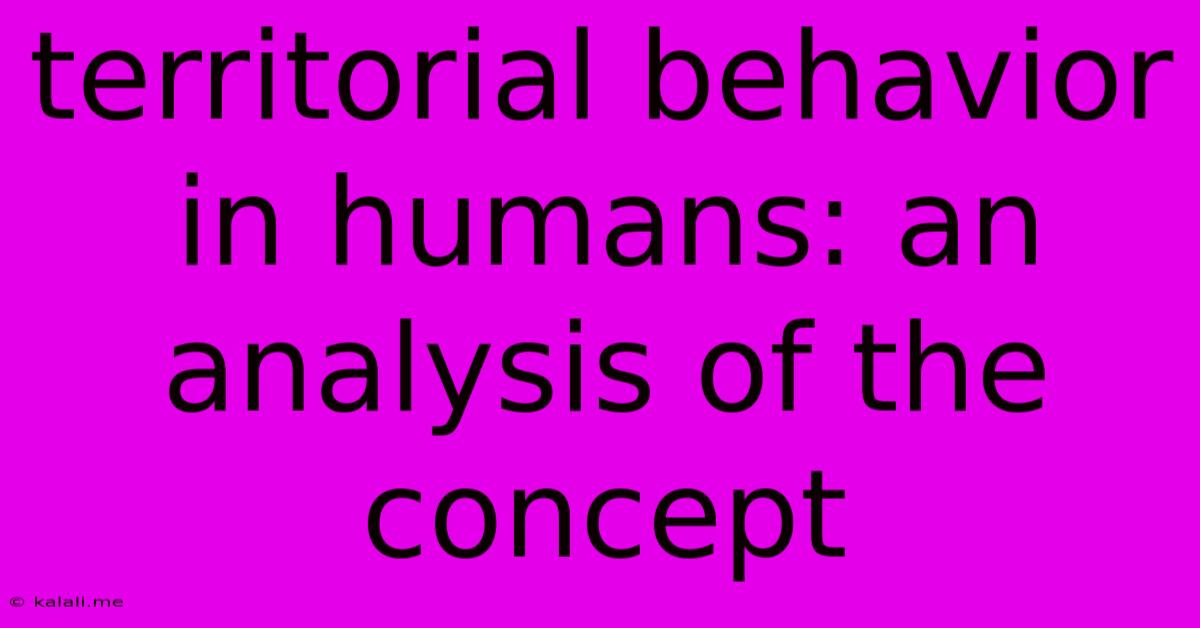Territorial Behavior In Humans: An Analysis Of The Concept
Kalali
Jun 06, 2025 · 3 min read

Table of Contents
Territorial Behavior in Humans: An Analysis of the Concept
Meta Description: Explore the fascinating concept of territorial behavior in humans. This article delves into the psychology behind claiming space, the various forms it takes, and its impact on social interactions and conflicts. Discover how understanding territoriality can shed light on human behavior and relationships.
Humans, like many other animal species, exhibit territorial behavior. While not as overtly aggressive as in some animals, the human expression of territoriality is complex and deeply ingrained in our social interactions, shaping our personal spaces, relationships, and even conflicts. This article analyzes the concept of territorial behavior in humans, exploring its manifestations and underlying psychological mechanisms.
What is Territorial Behavior?
Territorial behavior, in its simplest definition, involves the establishment and defense of a specific area or space. This "territory" can be physical, such as a home, office, or even a seat on a bus, or it can be more abstract, like a social position or intellectual property. The crucial element is the assertion of ownership and control over that area, often accompanied by actions to protect it from intrusion.
Manifestations of Human Territoriality
Human territoriality manifests in diverse ways, depending on the context and individual personality:
-
Personal Space: This is the most fundamental form of human territory. We each maintain a "bubble" of personal space, the distance we prefer to maintain between ourselves and others. Violation of this space can trigger feelings of discomfort, anxiety, or even aggression. Cultural differences significantly influence the acceptable distance.
-
Home Territory: Our homes represent a significant and powerfully defended territory. We personalize our homes, investing emotional significance into the space and feeling strongly protective of it. Intrusion into the home often evokes a stronger defensive response than intrusion into other territories.
-
Work Territory: Offices, desks, and even specific equipment can become strongly defended territories within the workplace. This can manifest as personalized decoration, guarding of resources, or resistance to colleagues encroaching on one's space or workflow.
-
Social Territories: These are less physical and more abstract. They involve claiming ownership of a social group, position, or idea. For instance, a strong sense of belonging to a specific community or defending one's intellectual property represents a form of social territoriality. This often plays out in online forums or discussions, with passionate defenses of viewpoints.
The Psychology of Territoriality
Several psychological factors contribute to human territoriality:
-
Security and Safety: Territoriality provides a sense of security and control over one's environment. Knowing one has a safe and predictable space reduces anxiety and stress.
-
Status and Identity: The size and quality of one's territory can signal social status. Larger, more desirable territories often indicate higher status within a social group. Furthermore, personalizing a space reflects and reinforces one's identity.
-
Resource Control: Territorial behavior often serves to control access to resources, whether physical (e.g., food, water) or social (e.g., influence, information).
-
Self-Esteem: Successfully defending one's territory can boost self-esteem and confidence. Conversely, territorial violations can lead to feelings of vulnerability and powerlessness.
Territoriality and Conflict
Territorial disputes are a common source of conflict in human societies, ranging from minor disagreements over personal space to major international conflicts over land ownership. Understanding the psychological basis of territoriality can help in managing and resolving these conflicts through negotiation and compromise. Effective communication and respect for personal boundaries are crucial in preventing escalated conflicts.
Conclusion
Human territorial behavior is a complex phenomenon, influenced by psychological, social, and cultural factors. Understanding its various manifestations and underlying motivations is crucial for fostering positive social interactions and resolving conflicts peacefully. By recognizing the importance of personal space, respecting others' territories, and communicating effectively, we can create more harmonious and collaborative environments. Further research is continually unraveling the nuances of this fascinating aspect of human behavior, providing valuable insights into the intricacies of human interaction and social dynamics.
Latest Posts
Latest Posts
-
Hooking Up A Dishwasher To Garbage Disposal
Jun 07, 2025
-
Easy Preprints To Submit Energy Papesr To
Jun 07, 2025
-
Can You Put An Anchor In A Stud
Jun 07, 2025
-
How To Tell If A Number Is Divisible By 4
Jun 07, 2025
-
How Tall Should Dining Room Table Legs Be
Jun 07, 2025
Related Post
Thank you for visiting our website which covers about Territorial Behavior In Humans: An Analysis Of The Concept . We hope the information provided has been useful to you. Feel free to contact us if you have any questions or need further assistance. See you next time and don't miss to bookmark.